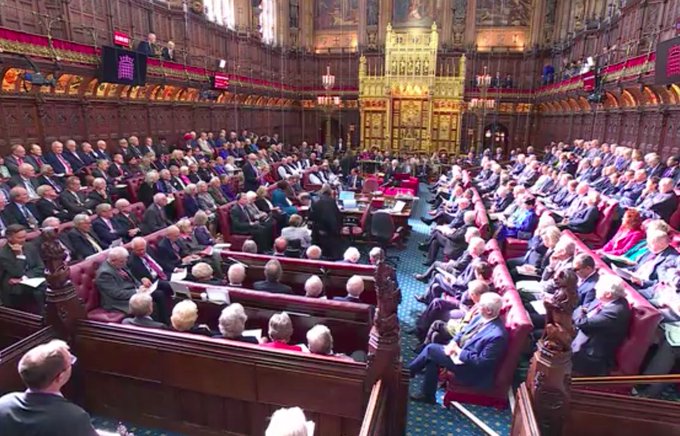“Let’s be very very clear,” Kim Leadbeater told the House of Commons on November 29 last year. “The model that is being proposed here…is nothing like what happens in Canada.”
Here are fifteen important ways in which the Leadbeater bill resembles Canada’s disastrous model:
Here are fifteen important ways in which the Leadbeater bill resembles Canada’s disastrous model:
(Canadian details taken from this extraordinary @TheAtlantic story: ) 
https://x.com/TheAtlantic/status/1959484606081642684

1. Vague criteria.
Canadian AS advocates pledged “stringent” safeguards, but “the criteria themselves were vague when you looked closely.”
Here, the bill’s proponents have refused to tighten the definition to exclude eg anorexia, diabetes and disability.

Canadian AS advocates pledged “stringent” safeguards, but “the criteria themselves were vague when you looked closely.”
Here, the bill’s proponents have refused to tighten the definition to exclude eg anorexia, diabetes and disability.
https://x.com/ddhitchens/status/1930004225268036002


2. Autonomy at all costs.
In Canada, “the concept of autonomy…has become paramount, allowing…advocates to push for expansion in terms that brook no argument.”
Similar rhetoric here, eg this: “Ultimately, it does come down to a question of autonomy.”
In Canada, “the concept of autonomy…has become paramount, allowing…advocates to push for expansion in terms that brook no argument.”
Similar rhetoric here, eg this: “Ultimately, it does come down to a question of autonomy.”
https://x.com/danny__kruger/status/1889746288767361451
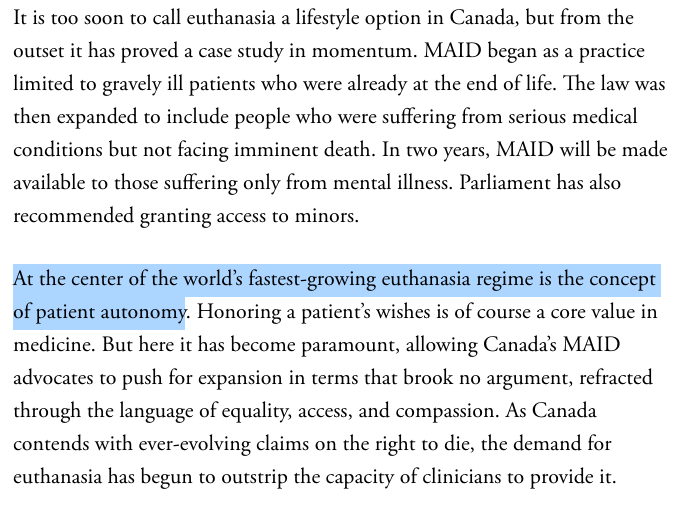
3. Lack of responsibility.
“Canada’s leaders seem to regard MAID from a strange, almost anthropological remove: as if the future of euthanasia is no more within their control than the laws of physics.”
Here, too, nobody will say the buck stops with them:
“Canada’s leaders seem to regard MAID from a strange, almost anthropological remove: as if the future of euthanasia is no more within their control than the laws of physics.”
Here, too, nobody will say the buck stops with them:
https://x.com/ddhitchens/status/1929901026645012505
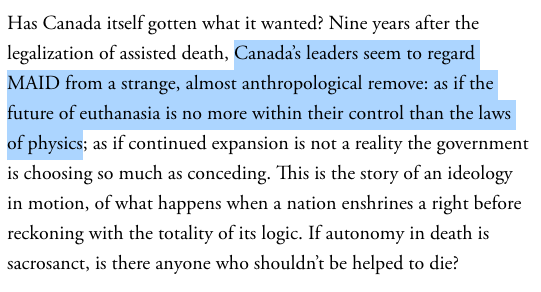
4. Kicking the can down the road.
“Following the law’s passage, doctors, nurse practitioners, pharmacists, and lawyers scrambled to draw up the regulatory fine print.”
Here too, huge questions have been left for others to answer if the law is passed.

“Following the law’s passage, doctors, nurse practitioners, pharmacists, and lawyers scrambled to draw up the regulatory fine print.”
Here too, huge questions have been left for others to answer if the law is passed.
https://x.com/ddhitchens/status/1937944085647536441
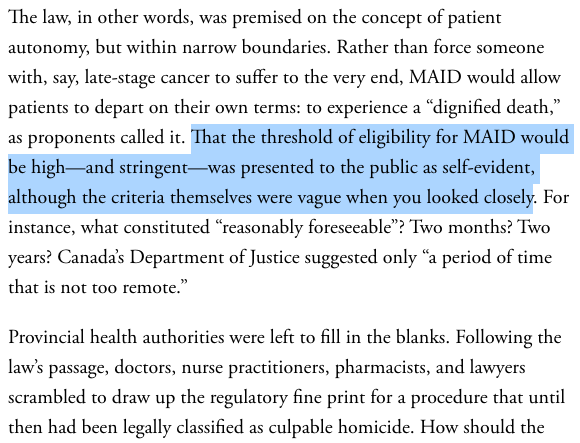
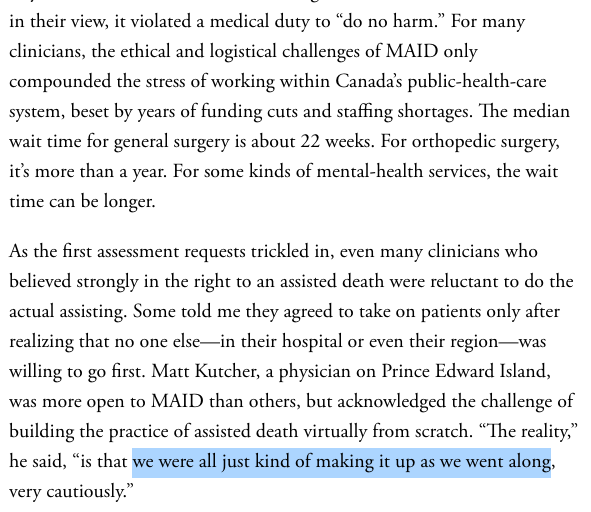
5. Ignoring inequality.
Elaina Plott Calabro writes of doctors euthanizing people who were obviously isolated and vulnerable.
Here, AS advocates have refused to address this point—and have voted to allow AS if the sole motive is financial insecurity.
Elaina Plott Calabro writes of doctors euthanizing people who were obviously isolated and vulnerable.
Here, AS advocates have refused to address this point—and have voted to allow AS if the sole motive is financial insecurity.
https://x.com/nmdacosta/status/1935983606528110751
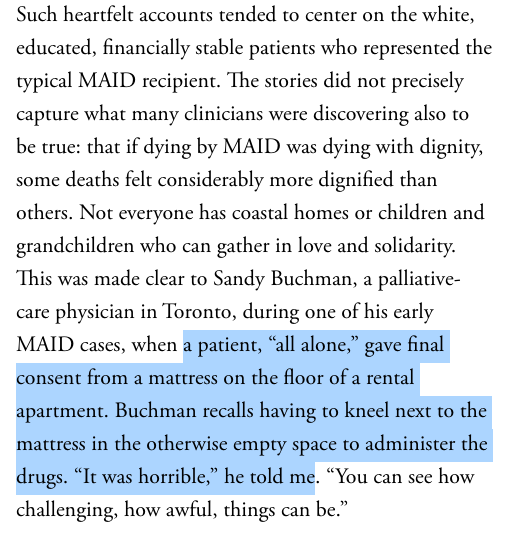
6. People choosing AS because of lack of support.
Plott tells the story of a man who changed his mind when his family started visiting him.
Under the UK bill, you can receive lethal drugs if your sole motive is loneliness or a failure of public services.
Plott tells the story of a man who changed his mind when his family started visiting him.
Under the UK bill, you can receive lethal drugs if your sole motive is loneliness or a failure of public services.
https://x.com/nmdacosta/status/1935983606528110751
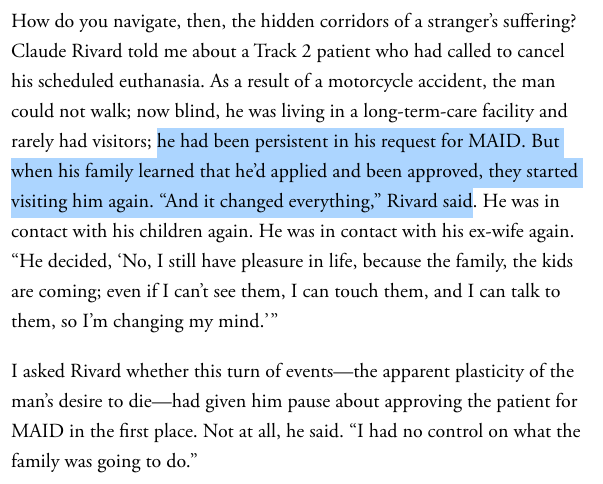
7. Systemic failure.
One applicant: “It was not a genetic disease that took me out, it was a system.”
Here, not only can you request AS because of public service failure, but applicants are not guaranteed eg a meeting with a palliative care specialist.
One applicant: “It was not a genetic disease that took me out, it was a system.”
Here, not only can you request AS because of public service failure, but applicants are not guaranteed eg a meeting with a palliative care specialist.
https://x.com/ddhitchens/status/1905373617786888420
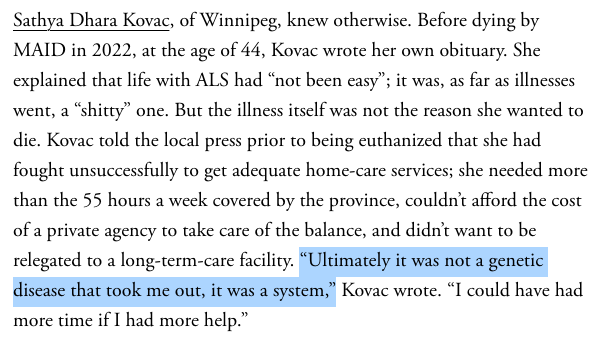
8. Feeling like a burden as a reason for requesting assisted suicide.
This is happening in Canada, and is common in all jurisdictions which record people’s reasons.
Proponents of the UK bill have repeatedly rejected attempts to prevent this:
This is happening in Canada, and is common in all jurisdictions which record people’s reasons.
Proponents of the UK bill have repeatedly rejected attempts to prevent this:
https://x.com/JamesCleverly/status/1889723455622324572
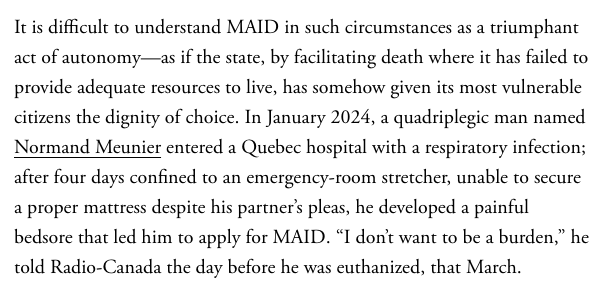
9. Doctors can raise the subject of AS.
In Canada, this has become a common complaint: that healthcare professionals can bring up AS unprompted.
Here, amendments to prevent this have been rejected:
In Canada, this has become a common complaint: that healthcare professionals can bring up AS unprompted.
Here, amendments to prevent this have been rejected:
https://x.com/ddhitchens/status/1923323704064245895
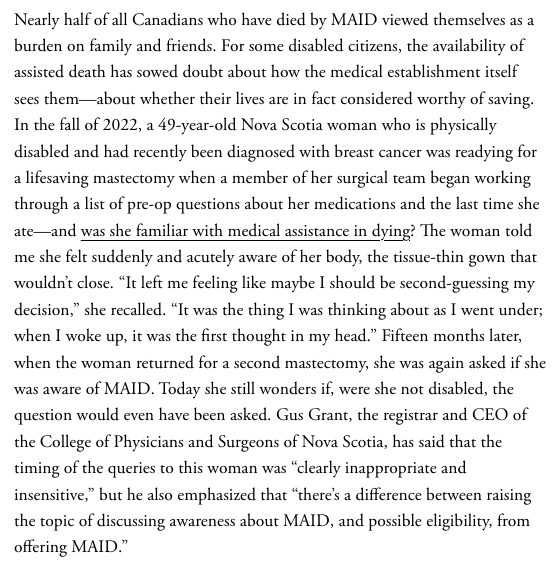
10. Lack of appeals process.
Plott says this is part of “the hollow oversight of MAID”.
No appeals process in the UK either, once the panel approves—even if, say, a family or a GP has crucial information that could help the panel reconsider.
Plott says this is part of “the hollow oversight of MAID”.
No appeals process in the UK either, once the panel approves—even if, say, a family or a GP has crucial information that could help the panel reconsider.
https://x.com/ddhitchens/status/1937957521928474981
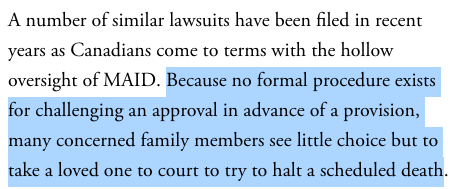
11. Rejecting psychiatric expertise.
In Canada, there are plans to expand the law despite the objections of leading organisations.
Here, the Royal College of Psychiatrists have come out against the bill after their concerns were repeatedly ignored:
In Canada, there are plans to expand the law despite the objections of leading organisations.
Here, the Royal College of Psychiatrists have come out against the bill after their concerns were repeatedly ignored:
https://x.com/BBCNewsnight/status/1922420095302734221
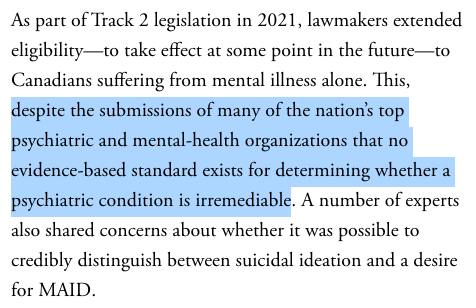
12. Dangers to the psychologically vulnerable.
In Canada, AS is open to those “largely motivated by their mental disorder”.
The UK bill is open in the same way, and psychiatrists say the bill doesn’t give room to “identify an unmet need like depression”.

In Canada, AS is open to those “largely motivated by their mental disorder”.
The UK bill is open in the same way, and psychiatrists say the bill doesn’t give room to “identify an unmet need like depression”.
https://x.com/SkyNews/status/1935389637914030374
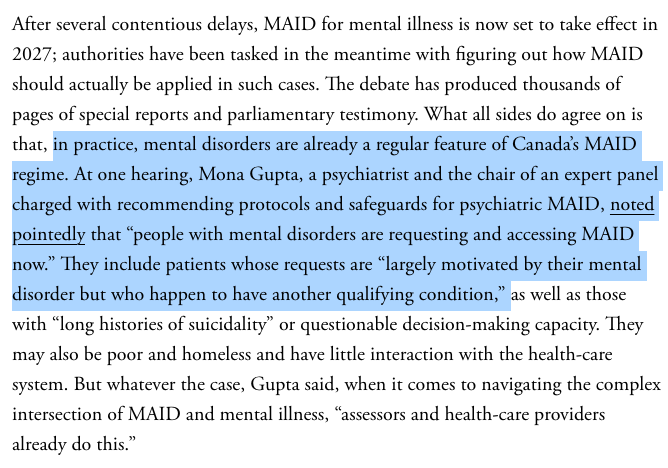
13. Anonymous, bureaucratic processes.
Plott Calabro points out that, under the Canadian model, doctors are unlikely to know the patients requesting AS.
Here the same is likely to be true, as assisted suicide may well be outsourced to private firms:
Plott Calabro points out that, under the Canadian model, doctors are unlikely to know the patients requesting AS.
Here the same is likely to be true, as assisted suicide may well be outsourced to private firms:
https://x.com/ddhitchens/status/1929272200197996639
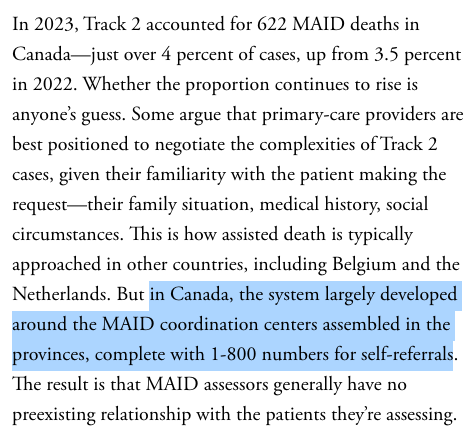
14. Complacent predictions from civil servants.
In Canada, estimates of uptake were far lower than the reality.
Here, the government impact assessment crudely transferred numbers from a completely different healthcare system:
In Canada, estimates of uptake were far lower than the reality.
Here, the government impact assessment crudely transferred numbers from a completely different healthcare system:
https://x.com/ddhitchens/status/1919409056147501230
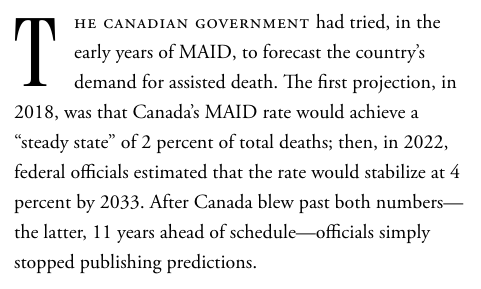
15. Complacency about international comparisons.
Canadian judges said the Belgian experience was irrelevant because Canada was totally different.
The bill’s supporters say that, when it comes to legislating here, we can just ignore the Canadian disaster.
Should we trust them?
Canadian judges said the Belgian experience was irrelevant because Canada was totally different.
The bill’s supporters say that, when it comes to legislating here, we can just ignore the Canadian disaster.
Should we trust them?
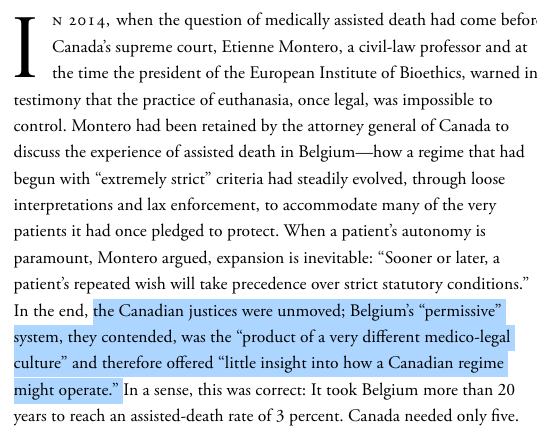
• • •
Missing some Tweet in this thread? You can try to
force a refresh


